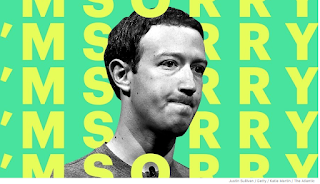Carole Cadwalladr @carolecadwalla on Twitter on Mark Zuckerberg's appearance before Congress in Washington:"Remember this. #Zuckerberg only here because: #journalism. But #journalism broken because: @facebook."
Mark Zuckerberg interviewed in The Atlantic: “I think there’s just been a very basic shift in how we view our responsibility. We used to view our role as building tools for people and saying, ‘Hey we’re going to put this power in your hands.’ And we think people are basically good, and we think that that can have a net positive effect. Now I just think we understand—both because of the ability for us to develop these things and because of the scale at which we operate—that it’s also our responsibility to make sure that all these tools are used well, not just to put them in people's hands.You know, you can’t just give people a voice. You need to also make sure that that voice is not used for foreign interference in elections or disseminating fake news.”
Lionel Barber @lionelbarber on Twitter: "Days after Boris Johnson congratulates Viktor Orban on his election victory, Magyar Nemzet, Hungary’s major opposition newspaper (and online op) announces it is closing after 80 years in print. A light goes out in central EUrope ....."
The Times [£] reports: "Two out of every three stories shared on social media on the attempted assassination of Sergei and Yulia Skripal are from Kremlin-backed media outlets. The discovery came as officials said information warfare was four times more significant a factor than military force in today’s standoff with Russia — in a reversal of the Cold War years. Moscow has flooded pro-Russia news channels and social media platforms with more than 20 conspiracy theories about the Salisbury attack to deflect attention from Britain’s assertion that Moscow is to blame.”
Spokesman for Salisbury District Hospital, which is treating Sergei Skripal, condemning the behaviour of a Russian tv crew, as reported by SKY News: "This footage shows appalling behaviour on the part of these Russian journalists - approaching staff in the middle of the night with no warning and without asking for any permission. Our staff, who have been rightly lauded for their recent efforts, working tirelessly to give all of our patients high quality care, deserved better. We would like to reiterate that any attempt to harass, intimidate or cause distress to any of our staff or patients is absolutely unacceptable and will not be tolerated."
The Guardian reports: "The Assad regime “assassinated” the Sunday Times correspondent Marie Colvin as part of its campaign targeting journalists covering the Syrian civil war, according to a claim filed in a Washington court on Monday. The legal action over the 2012 killing is the first war crimes-related case against the Syrian government to reach court. It includes evidence from high-placed defectors who testify that reporters were tracked via their satellite phone signals. Colvin, an American reporter who operated out of London, and Remi Ochlik, a French photographer, were killed “in a targeted rocket attack” on a makeshift media centre in the rebel-held city of Homs, the papers allege."
Repoters Sans Frontiers secretary-general Christophe Deloire, after Palestinian journalist Yaser Murtaja was shot dead by Israeli soldiers in Gaza: “We condemn the disproportionate reaction by Israeli forces, who killed or wounded several civilians including journalists. We urge the Israeli government to adhere strictly to UN Security Council Resolution 2222 on protecting journalists, adopted in 2015, and we call for an independent investigation leading to the conviction of those responsible for this crime against press freedom.”
BBC's Nick Robinson in the New Statesman: "Impartiality is difficult. Perhaps never more so than in recent years when deep divides have opened up over Brexit, Scottish independence and inside both our major parties. We don’t always get it right. However, there is still a powerful case for impartial broadcast journalism that seeks to inform rather than influence, or sway, or respond to commercial imperatives, staffed by people who – regardless of their personal background or private views – are committed to delivering what Watergate reporter Carl Bernstein calls 'the best obtainable version of the truth' and offering their audience a free, open and broad debate. The alternative is news that largely broadcasts people you like saying things you agree with. I say as gently as I can to people on both sides of the Brexit argument – be careful what you wish for."
Natasha Morris, NUJ legal & equality officer, on the gender pay gap in the media: “It is clear from the latest figures that more needs to be done to support women into senior positions within the workplace, ensuring that maternity leave does not mean the end of career progression. Employers must cultivate a culture where shared parental responsibility is the norm and not the exception and part-time roles are better paid. It is vital that companies are transparent about pay and where inequality is identified that robust and immediate measures are taken to address these issues.”
Indira Lakshmanan @Indira_L on Twitter: "The death of local news is affecting civic behavior and voting patterns. Deep dive by @Politico found Trump performed best in 'news deserts,' areas with lowest newspaper circulation/readership." https://politi.co/2qfw2fx
Illustrator Mick Hill in a BBC interview on how he added "naughty" images to his artwork on biscuit tins: "I knew I made it when I got into the Whitstable Times."
[£]=paywall
















No comments:
Post a Comment